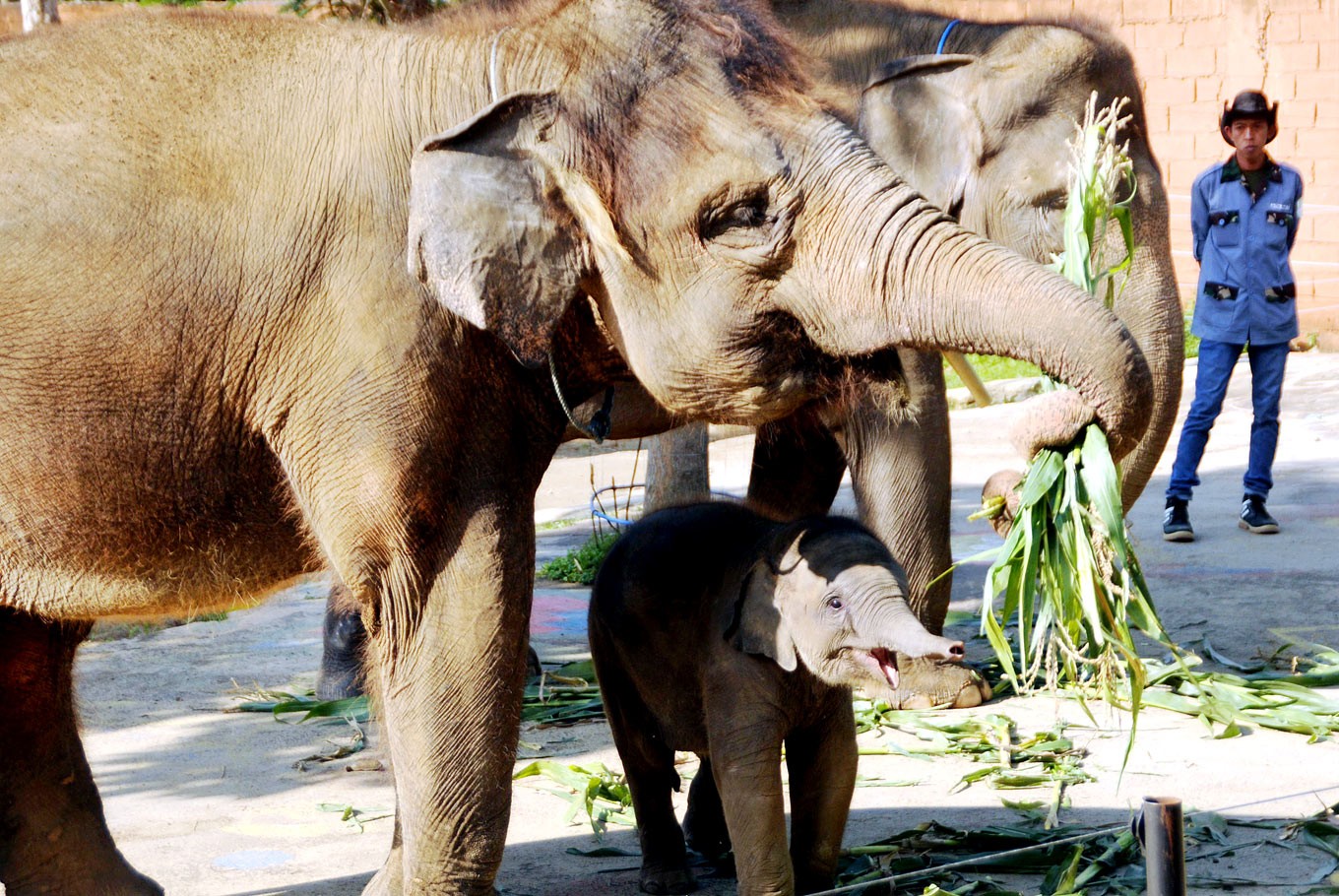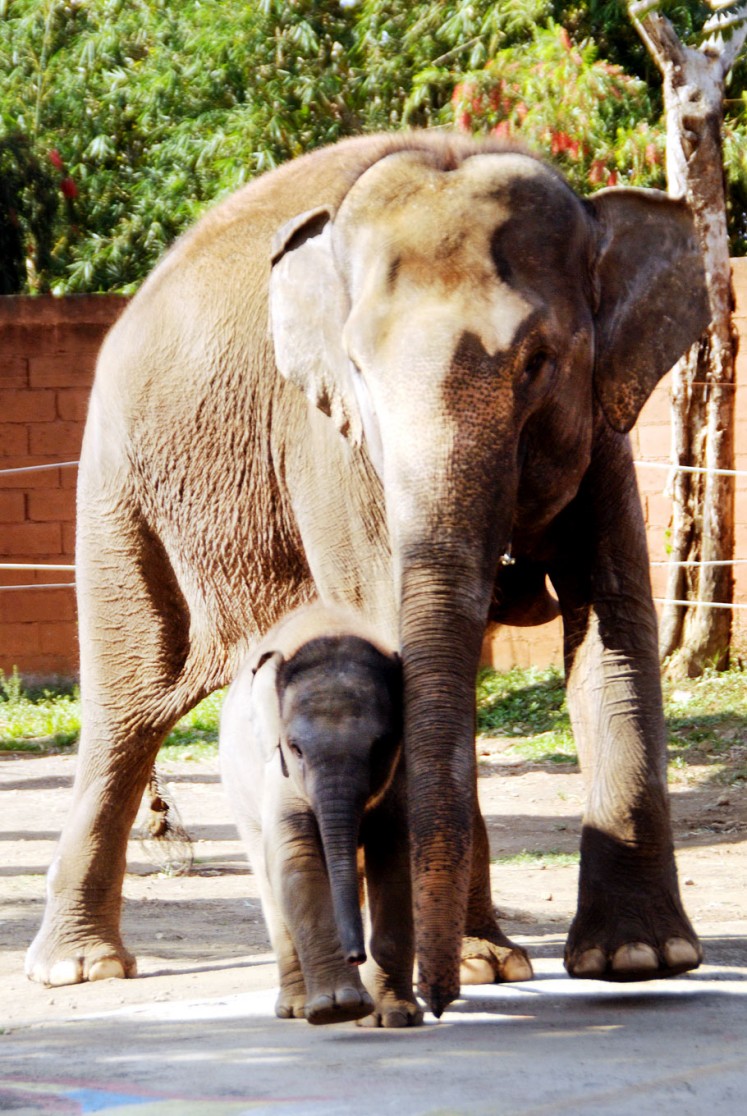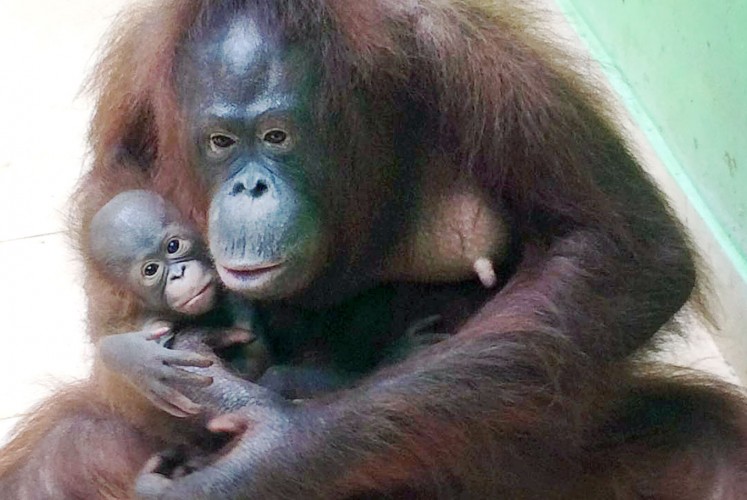Popular Reads
Top Results
Can't find what you're looking for?
View all search resultsPopular Reads
Top Results
Can't find what you're looking for?
View all search resultsSumatran elephant and Kalimantan orangutan born at Batu Secret Zoo
Change text size
Gift Premium Articles
to Anyone
T
wo mammals endemic to Indonesia, a Sumatran elephant and a Kalimantan orangutan, have been born under an ex-situ breeding program (a process outside their natural habitat) at Batu Secret Zoo in Batu city, East Java.
The birth of the calf is important to the conservation of this elephant subspecies, which is categorized as critically endangered by the International Union for Conservation of Nature. Sumatran elephants in Indonesia are protected by Law No. 5/1990.
The population of Sumatran elephants was estimated at 2,400 in 2014, but this figure is believed to have dwindled over time.
“The number declined due to conflicts with people and repressive action against the animals and their habitat,” Batu Secret Zoo veterinarian Roosy Margaretha said, adding that illegal logging was another cause of the decrease.
Roosy added that the elephants are frequently poached for their tusks, which are usually used as decorations or souvenirs.
“Yet another factor hampering growth of the elephant population is the long gestation period, lasting for 22 to 23 months, with only one calf resulting from every mating,” she said.
The baby elephant born on July 7 was the first calf bred by the zoo, which is an ex-situ conservation institute. The female calf weighed 85 kilograms and was 78 centimeters in height at birth.
New kid on the block: Si Mungil (Cutie), a three-month-old female Sumatran elephant, walks with mother Tira. (JP/Nedi Putra AW)The mother elephant, named Tira, 23, comes from the Bukit Serelo Elephant Training Center, Lahat, South Sumatra, while the father, 20, Andalas, comes from the Padang Sugihan Center, Banyuasin, South Sumatra. Both were brought to Batu Secret Zoo in 2015.
The breeding, Roosy said, was successful thanks to the careful treatment of the mother elephant.
“Our team was assisted by a veterinary surgeon from Germany, Christoper Stremme, an elephant reproduction expert who conducted thorough tests and ultrasonography examinations on the expectant mammal,” she said.
Tira’s ample attention to the calf contributed to its proper growth in the past three months.
“Elephants live in herds so that the female members will help take care of each other’s young,” Roosy said.
Si Mungil (Cutie), as the calf is called, seemed at ease when “aunt” Anis was feeding her. Female Sumatran elephants are unique for having very short tusks, as Anis has.
Roosy praised the four elephant keepers who had looked after the mammals daily during the mother’s gestation period, ensuring that the elephants did not experience too much stress.
The Natural Resources Conservation Agency ruled that the calf is to be introduced to the public after she’s older than three months. There are now five Sumatran elephants in Batu Secret Zoo, including the calf.
Bonding: Orangutan Toti remains aggressive and protective over her baby. They have yet to be introduced to the public at Batu Secret Zoo in East Java. (JP/Nedi Putra AW)Another success of the ex-situ breeding program in the zoo was the birth of a Kalimantan orangutan, which is also included in the critically endangered category and protected by the aforementioned law. Like Sumatran elephants, the orangutan population is decreasing because of poaching, illegal logging, forest conservation, climate change and wildfires.
The baby male orangutan weighed 2 kg when it was born on July 24. Its mother, Toti, 12, was a captured Kalimantan orangutan taken care of at Maharani Zoo, Lamongan, East Java, before being transferred to Batu Secret Zoo.
The male, Bontang, is of Thai origin, previously located at Safari Park, Cisarua, Bogor, West Java. He was trained into Thai boxing before being rescued.
Batu Secret Zoo cannot yet allow Toti and the baby orangutan to be seen by visitors.
“Toti is still aggressive and very protective over the baby, so we’ll continue to give them special treatment and care in their cage until the end of the weaning period, which is around six months,” said Roosy.
Batu Secret Zoo’s achievement was appreciated by Iwan Kurniawan, project manager of the Javan Lutung Rehabilitation Center, also known as the Javan Langur Center, the Aspinall Foundation program.
“The breeding process of endemic animals in this ex-situ conservation institute has a fairly high degree of difficulty and risk because they are located within a zoo with a recreational aspect,” Iwan said.
He suggested that with the growing number of the mammals, they should be given open spaces by being returned to their natural habitat, which could be realized through cooperation with wildlife conservation organizations.
“It’s an ideal follow-up but it all depends on the relevant zoo’s policy and conditions,” he said.













